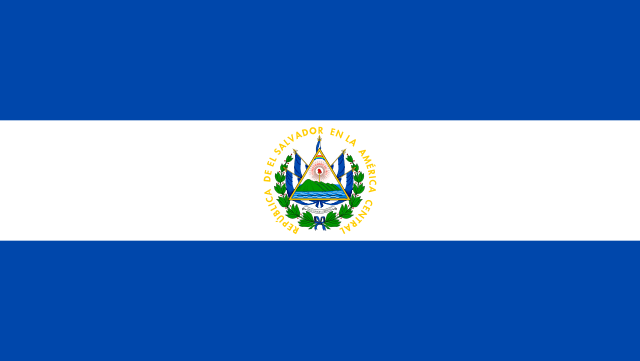
UTC:
Capital City:
Language:
Population:
Currency:
Country Code:
Domain:
-6
San Salvador
Spanish
6.39 million
US dollar
+503
sv.
Israel-El Salvador relations
As of 2024, El Salvador and Israel have yet to sign a tax treaty, but they have maintained a longstanding relationship since 1947, with formal recognition established in 1948. This solidified their friendly relations. The two nations share common values, and their trade has consistently ranged from US $6-10 million annually, with Israeli exports exceeding imports from El Salvador.
Details about the Embassy of Israel in El Salvador
Address: Center Giant Financier, Tower B, Level 11, Alameda Roosevelt and 63 South Avenue, San Salvador
Phone: +35544508502
Website: http://sansalvador.mfa.gov.il
Email: info@sansalvador.mfa.gov.il
Details about the Embassy of Republic of El Salvador in Israel
Address: 6 Hamada Street, Naorbuilding, 4 Piso, Herzliya Pituah 46733
Phone: +972-9 955-6343
Website: https://www.facebook.com/EmbajadaIsraelSV
E-mail: embassy@el-salvador.org.il
Business activity in El Salvador
El Salvador offers an attractive environment for investors, characterized by a favorable cost-quality ratio of its labor force. According to El Salvador’s Labor Code, wages are freely negotiated but must meet or exceed the minimum wage set by the National Minimum Wage Council (CNSM), which is currently the third lowest in the region. Additionally, El Salvador has the lowest labor liability percentage (31%) in Central America.
Key sectors for investment include tourism, agribusiness, aeronautics, manufacturing, textiles, energy, and pharmaceuticals. The nation’s attraction is further increased by free trade zones strategically positioned for efficient operations, featuring attractive tax incentives such as duty and tax-free importation of essential raw materials. Industrial parks are strategically located near major cities, with seamless access to essential infrastructure like highways, airports, and world-class ports. Additionally, investors can leverage Service Parks, designated zones beyond the national customs territory, to capitalize on the benefits offered by the International Services Law.
Bilateral agreements between El Salvador and Israel
Several agreements were signed between Israel and El Salvador:
- International Investment Agreements
Reciprocal Promotion and Protection of Investments
The International Investment Agreement between Israel and El Salvador, signed on April 3, 2000, and effective from July 7, 2003, aims to mutually promote and protect investments. It establishes principles of fair and equitable treatment, including Most Favored Nation and National Treatment for investments and returns, safeguards against expropriation, and provisions for compensation in cases of losses due to conflict or similar events. The treaty also outlines mechanisms for the repatriation of investments and returns, and for resolving investment disputes, either through diplomatic channels or international arbitration, ensuring a stable and predictable legal environment for investors from both nations.
To read the Agreement in English, please click here.
Residency for Tax Purposes in El Salvador
Residence of an Individual
In El Salvador, an individual is considered a tax resident if they fulfill the following criteria:
- Duration of Stay: If an individual resides temporarily or permanently in El Salvador for more than 200 consecutive days during a calendar year, they are considered a tax resident.
- Main Source of Income: If the individual has their main source of income in El Salvador, they are also considered a tax resident.
To read about how an individual is considered a resident of Israel, click here.
Residency of a Company
In El Salvador, a company is considered a resident entity for tax purposes if it is incorporated in the country. This also includes branches of foreign companies authorized in El Salvador and entities operating as a permanent establishment (PE) in the country. A PE is created when a foreign resident performs corporate activities through a fixed place of business, a representative with authority to conclude contracts, or a construction/installation project or supervision activity exceeding six months.
To learn about how a company is considered a resident of Israel, click here.
The Tax System in El Salvador
El Salvadorian Tax Authority is called the General Directorate of Internal Taxes (Dirección General de Impuestos Internos, DGII).
Income taxation: From 0% to 30%
Taxation of companies and branches: 25%, 30%
VAT: 13%
Capital gains tax: 10%
Withholding Tax
| El Salvador Internal Tax Rate | Israel Internal Tax Rate |
Personal Income tax (Tax brackets) | 0%, 10%, 20%, 30% | Up to 50%
|
Corporate income tax | 25%, 30% | 23% |
Capital gains tax rate | 10% | 25%-30% (plus exceptional income tax for high earners at 3%) |
Branch tax | 25%/30% | 23% |
Withholding tax (Non-Resident) Dividends |
5% |
25% or 30%
|
Interest
| 10% | 15%/25%/23% |
Royalties | 10% | 23%-40% |
VAT | 13% | 18% |
Relocation to El Salvador
Relocating a business to El Salvador can be advantageous for several reasons. The country’s strategic position in Central America offers convenient access to both North and South American markets. It’s also a part of numerous free trade agreements, which simplifies the process of accessing international markets. The Salvadoran government provides attractive investment incentives, including tax breaks and reduced tariffs, to draw foreign investments. Additionally, El Salvador has a growing economy with diverse opportunities across various sectors. Businesses can benefit from a skilled yet cost-effective labor force and ongoing investments in infrastructure aimed at enhancing connectivity, transportation, and logistics.
The Jewish community in El Salvador, primarily based in San Salvador, is vibrant and organized around the Community Center in San Benito, which hosts the country’s only synagogue. They follow Conservative Judaism with regular services and a variety of Jewish educational programs for all ages. Additionally, the community engages in social assistance and connects Salvadoran Jewish youth with wider Latin American Jewish activities through the Union of Jewish Congregations of Latin America.
Real Estate Taxation
In El Salvador, real estate taxation typically involves a property tax which is levied on the value of the property. The tax rate and the method of valuation can vary depending on the location and type of property, but generally a tax of 3% is charged on the amount of the property’s value that exceeds USD 28,571.43. Property transfer taxes are also applied when real estate is bought or so additionally, rental income from real estate is subject to income tax.
Transfer of Funds from Israel to El Salvador
According to section 170(a) of the Israeli income tax ordinance, any transfer of payment to a non-Israeli resident is subject to 25% of withholding tax. The tax authority can allow, under certain circumstances, to reduces or dismiss the withholding tax. Our firm handles withholding tax matters with the Israeli Tax Authority.
In providing advice regarding the transfer of money abroad, in addition to the issue of withholding tax, our office handles the requirements of the foreign banks, such as an accountant’s approval regarding the payment of taxes and examines additional actions required in light of the uniform standard of CRS between the countries – automatic exchange of information between countries which is carried out first through the banks and then between the tax authorities of each two countries.
The banks raise many difficulties and charge high fees for converting shekels into other currencies, so it is important to consult before transferring the funds – Contact us.
For more information on money transfers abroad, click here.
Types of Business Entities in El Salvador
Sole proprietorship
A sole proprietorship is the simplest and most common type of business in El Salvador. It is owned and operated by one person, making it ideal for small businesses and self-employed professionals who want full control and are willing to take on all the risks and responsibilities.
The Public Limited Company
This is the most common type of company in El Salvador. It has shareholders, and its capital is based on stocks. The company is legally represented by a Board of Directors or a single administrator.
Limited Liability Company
The key feature of this company’s structure is that capital investment comes from a system of Social Participation, rather than through stocks. Combines features of partnerships and corporations, with limited liability for members.
Incentive Laws in El Salvador
El Salvador offers various incentives to attract foreign business investment, including tax exemptions and other benefits under specific laws. These include the Industrial and Commercial Free Zone Law, the Law of International Services, the Renewable Energy Incentives Law, the Tourism Law, and the Law for the Promotion of Manufacturing and Technological Innovation. These laws provide incentives such as corporate income tax (CIT) exemption, VAT exemption, municipal tax exemption, and exemptions on import duties for certain goods and equipment. Additionally, the Law for the Promotion of Technological and Manufacturing Innovation, which came into force in 2023, offers extensive tax incentives for activities in fields like software development, cloud computing, artificial intelligence, and other advanced technologies, for a period of 15 years.
Double Tax Treaties El Salvador
Spain






